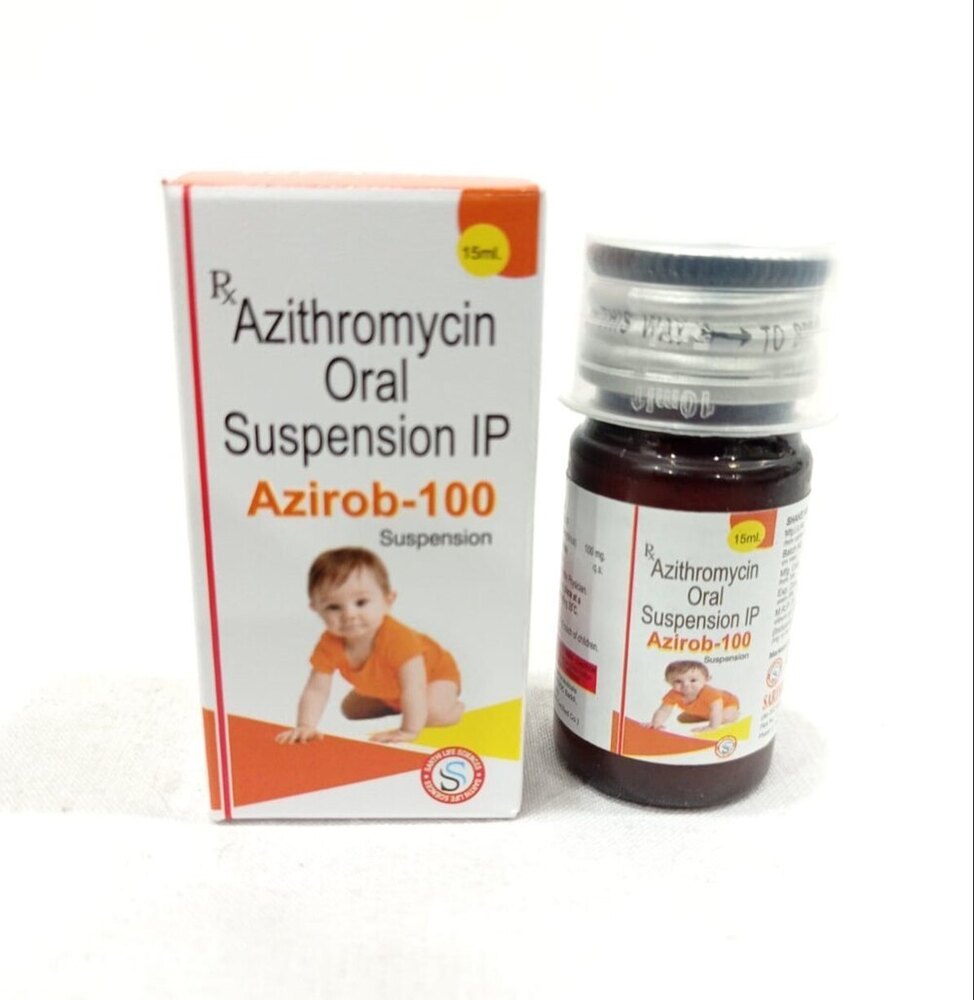Azithromycin Oral Suspension 100mg/5ml is an antibiotic used to treat various bacterial infections, particularly in children or individuals who have difficulty swallowing tablets. The oral suspension formulation provides a liquid form of the antibiotic, allowing for easier administration and dosing.
Active Ingredient:
- Azithromycin: Azithromycin is a macrolide antibiotic that works by inhibiting bacterial protein synthesis, preventing bacteria from growing and reproducing.
Common Uses:
Azithromycin oral suspension is prescribed for a variety of bacterial infections, including:
- Respiratory tract infections: Such as pneumonia, bronchitis, sinusitis, and pharyngitis (sore throat).
- Ear infections: Otitis media (middle ear infections), especially in children.
- Skin and soft tissue infections: Such as cellulitis and impetigo.
- Sexually transmitted infections: Including chlamydia and gonorrhea.
- Conjunctivitis: Bacterial eye infections.
- Helicobacter pylori eradication: In combination with other medications to treat peptic ulcers caused by H. pylori bacteria.
Dosage and Administration:
-
Concentration: Each 5 ml of the oral suspension contains 100mg of azithromycin.
-
Typical pediatric dosage:
- For respiratory tract infections (e.g., pneumonia, bronchitis), the usual pediatric dose is:
- 10 mg/kg on Day 1, followed by 5 mg/kg once daily on Days 2 to 5.
- For middle ear infections (otitis media), the typical dose is:
- 10 mg/kg on Day 1, followed by 5 mg/kg once daily for 4 more days.
- For chlamydia and gonorrhea, children are usually given a single dose of 20 mg/kg (up to 1g) on Day 1.
-
Adult dosage:
- Respiratory and ear infections: The typical adult dose is 500mg on Day 1, followed by 250mg daily for 4 days.
-
How to take: Shake the bottle well before each use to ensure the medication is evenly mixed. Use the measuring spoon or dropper provided to ensure the correct dose. The suspension can be taken with or without food.
Side Effects:
- Common side effects:
- Gastrointestinal discomfort: Nausea, vomiting, diarrhea, or stomach pain.
- Headache and dizziness.
- Skin rash or itching.
- Serious side effects (less common but more serious):
- Severe allergic reactions: Symptoms such as swelling of the face, lips, tongue, or throat, or difficulty breathing.
- Heart problems: Azithromycin can cause QT prolongation, leading to irregular heart rhythms (arrhythmias).
- Liver issues: Symptoms of liver damage may include yellowing of the skin or eyes (jaundice), dark urine, and abdominal pain.
- Severe gastrointestinal reactions: Persistent or severe diarrhea could indicate an infection like Clostridium difficile.
- Hearing loss: High doses or prolonged use may cause hearing loss, especially in those with kidney problems.
Precautions and Warnings:
- Allergic reactions: Azithromycin should not be used if you are allergic to it or other macrolide antibiotics (e.g., erythromycin).
- Liver or kidney disease: Caution is needed in individuals with liver or kidney issues. Dose adjustments may be necessary.
- Heart issues: Azithromycin can increase the risk of abnormal heart rhythms, particularly in individuals with heart disease, low potassium, or low magnesium levels.
- Pregnancy and breastfeeding: Azithromycin is considered safe during pregnancy (Category B). It passes into breast milk but is usually considered safe for breastfeeding. Always consult your doctor before use.
- Drug interactions: Azithromycin may interact with other medications, including antacids, blood thinners (e.g., warfarin), and heart medications. Be sure to inform your doctor about any other medications you're taking.
When to consult a doctor:
- Severe allergic reactions, such as swelling of the face, lips, or throat, or difficulty breathing.
- Signs of liver problems, such as yellowing of the skin or eyes, dark urine, or stomach pain.
- Heart problems, such as a racing heartbeat, dizziness, or fainting.
- Severe diarrhea, which could be a sign of Clostridium difficile infection.
- Hearing issues, such as ringing in the ears or difficulty hearing, especially at higher doses.
Conclusion:
Azithromycin Oral Suspension 100mg/5ml is a useful treatment for various bacterial infections, particularly in children or individuals who prefer liquid medication. It is important to follow the prescribed dosage and complete the full course of treatment to ensure the infection is fully cleared and to prevent the development of antibiotic resistance. If any severe side effects occur, contact your healthcare provider immediately.















